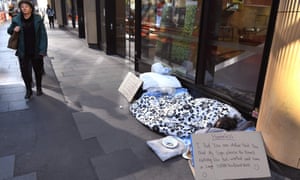Extract from The Guardian
More than 200 people are turned away from agencies each day and the situation in capital cities is worsening
Ahmed Yussuf was walking to catch a train at Melbourne Central station when a man approached him.
“He said, ‘Hey are you Somali?’” Yussuf, an African-Australian author, told Guardian Australia this week. “I said, ‘Yeah.’ Then he said he wanted to have a chat with me.”
The man told Yussuf he had recently arrived in Melbourne from Western Australia, though he did not say how or why. He did not have a phone, and so used a pen and paper for addresses and numbers he needed to remember.
“He was telling me that he has been sleeping rough and he was basically asking for some help,” Yussuf said.
The encounter that followed, which Yussuf went on to outline in a series of Twitter posts, showed how and why people “slip through the cracks”, he said.
“He said, ‘Hey are you Somali?’” Yussuf, an African-Australian author, told Guardian Australia this week. “I said, ‘Yeah.’ Then he said he wanted to have a chat with me.”
The man told Yussuf he had recently arrived in Melbourne from Western Australia, though he did not say how or why. He did not have a phone, and so used a pen and paper for addresses and numbers he needed to remember.
“He was telling me that he has been sleeping rough and he was basically asking for some help,” Yussuf said.
The encounter that followed, which Yussuf went on to outline in a series of Twitter posts, showed how and why people “slip through the cracks”, he said.
This is a story about how our social services fail people.
I am walking down Swanston St toward Melbourne Central. A Somali guy stops me to greet me, and ask for help. He tells me he’s just come from WA, and is sleeping rough. He is without access to a phone.
I am walking down Swanston St toward Melbourne Central. A Somali guy stops me to greet me, and ask for help. He tells me he’s just come from WA, and is sleeping rough. He is without access to a phone.
The man asked to borrow Yussuf’s phone. Yussuf called a crisis hotline on his behalf, and was told to contact Launch Housing, a service in inner Melbourne.
On calling them, he was told the man was ineligible for a bed because he was already registered to receive services in WA.
“They said he had housing in WA ‘so we can’t help you even though you’re in Melbourne,’” Yussuf said. “They were like, ‘sorry we can’t help you’, which I just found very strange.
“He’s been sleeping rough since last Friday and if he doesn’t find any housing he’ll be rough sleeping until Friday week.”
Demand for emergency housing far outstrips supply, a fact regularly lamented by service agencies, which say they are “chronically underfunded”.
About 235 people are turned away from agencies across Australia each day, figures show. On average, about 90 are from Victoria. In inner Melbourne alone, there are about 300 people sleeping on the streets each night.
“The heartbreaking reality is that Victoria is in a housing crisis, and it’s only getting worse,” said Andrew D’Arcy, a general manager at Launch Housing.
He said the organisation was forced to prioritise “people with the highest level of need, because there is not enough accommodation to meet demand”.
“We believe that everyone deserves a safe, secure, affordable home, so it’s incredibly challenging to have to turn so many people away,” he said.
The plight of people experiencing homelessness has been highlighted after the death of 25-year-old Courtney Herron, who was sleeping rough when she was allegedly killed. Henry Richard Hammond, 27, has been charged with her murder.
This week, a report from housing thinktank Ahuri showed that homelessness was increasingly concentrated in the capital cities, particularly Melbourne and Sydney.
After the man was rejected by the shelter, Yussuf helped him call his Centrelink social worker. He was told he would not be able to access an emergency crisis payment until the following week.
There are strict rules around crisis payments, including that a person can receive a maximum of two over 12 months.
Yussuf said the social worker did organise for the man to find a bed at another service in inner Melbourne, although he would have to wait another 24 hours.
“He was sleeping in some park,” he said. “Even if he got the emergency crisis payment he could have at least gone for some short-time housing through a motel or something like that.
“Because he couldn’t, he had to find somewhere else to go, through this whole confusing wormhole.”


No comments:
Post a Comment